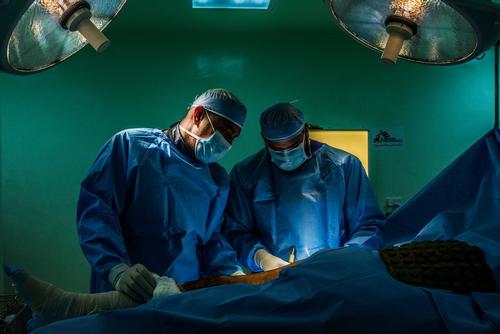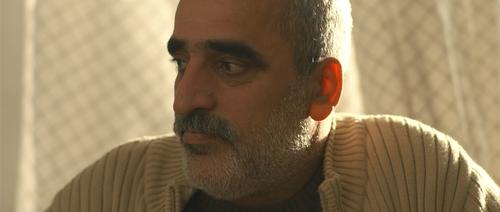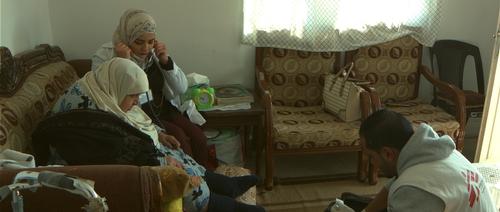Dr. Nasr Al Deen Al Omari, Psycho-Social Counsellor
I started working with MSF 4 years ago as a psycho-social counsellor. I brought with me a wealth of experience exceeding 30 years of work in that field, that involved many different sectors. I am grateful to have had the chance to work for MSF`s reconstructive surgery hospital, because it enables me to perform my duty of providing humanitarian aid. I will give you a brief glance about the nature of my role, and what makes the mental health services in this hospital so essential.
We are in the midst of action, even though it is happening elsewhere.
Our patients are mainly the casualties of war happening in their countries, like Iraq, Syria, Yemen, and Palestine; our aim is to bring back mental health stability to their lives, and help them re-assimilate with their communities, both throughout and after treatment. They suffered severe traumas caused by the violent events they witnessed, which led to the loss of their loved ones, or destruction of their property, or eviction and displacement. So it is extremely important to understand what they have been through, in order to plan for a treatment that suits their situation, and the nature of their suffering. Our patients are but a few cases of so many out there, who suffered traumas as a result of the events they witnessed.
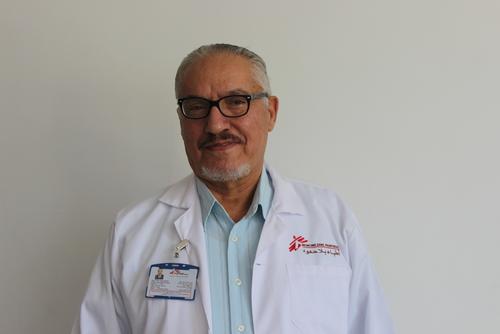
Our team consists of four social psychologists, and we deal with cases from all age groups targeted by the project, where each of us specializes in a certain age group, to provide the best possible mental health support services. We have a specialist to deal with children cases, and a she specialist to deal with women cases, while I deal with elderly men cases. We do, however, run joint activities, especially entertainment and social interaction events. We deal with approximately 20 cases a week in total.
Each and every case I dealt with, had and still have a deep impact on me personally, but given the nature of our work, and in respect of our professional values, I cannot share any details of these stories outside of work. I can however, speak generally of the violent events those people had to go through, and what difficult and horrifying circumstances they had to live with during the war.
For example, there is one case that I can still remember quite clearly, about a patient who was tortured in prison only a few hours after being wounded. He was deprived of the most basic health care services, and was severely subjected to extreme torture, at a time where he was still bleeding. A few days later, his wound got rotten and extremely infected, which led to the need of an amputation surgery later. I cannot forget when he spoke to me with tears in his eyes, he was treated so inhumanely.
It is still a great pleasure to work with those people though, as we can witness improvements in their mental health condition, which has a great positive effect on their treatment. I wish the day will come, where we will stop to have such cases, where all conflicts in this region stops, and may the mental and physical casualties stop with it.
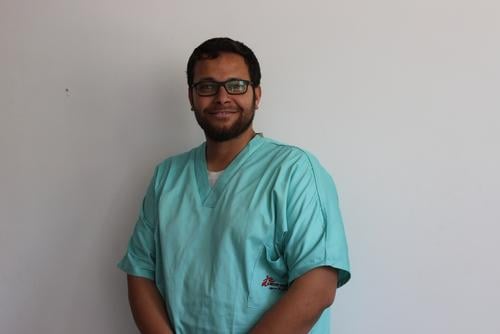
Hassan Abu Hatab – Caretaker
I am Hassan Abu Hatab, I am 28 years old and work as a caretaker in MSF’s reconstructive surgery hospital. Most people have no idea what a caretaker in MSF does, and the simplest way to describe it is: “Attending to the tiniest daily details of our patients”, spending a long time with them around the day, and even at night during night shifts.
My part is to follow up the medical needs of patients, completing what the medical staff in the project has already done, so we provide them with daily meals, and give them their prescribed medicines. We also care for their different needs of hygiene and sterilization, and this is an important and delicate side in our job, especially that so many war wounded suffer antibiotic-resistant infections, and sometimes they need to be isolated and adhered to special procedures of hygiene and sterilization. We gave our patients all the time they need to talk about the difficulties they have been through in their countries, and the longing they have for their houses, families and homelands. And we often work as a link between them and the Psycho-social support team inside the hospital.
We see the patients every day, and spend more time with them than the time we spend with our families, so we fully understand their needs and their ups and downs during the long process of recovery in MSF’s reconstructive surgery hospital. The ultimate aspect of project is not only the surgical care it provides, but the sense of humanity that motivates every staff member to apply the highest human standards in serving the patients, regardless to whether a surgeon, a physiatrist, a nurse or a caretaker, as we all comprehend the suffering those wounded have been through because of the many regional wars.
Every case I worked on along the past years had a speciality that pushed me to continue my work with MSF, but one of the most memorable patients was a Syrian child called “Orjouan”, who was 3 years old, and lost her mother and brothers in the Syrian war, and also lost her childhood because of the severe burns and fractions she had, and she was calling every woman she sees “Mum” because she was missing her mother that much. ‘’Orjouan’’ is just one of the hundred cases we deal with on daily basis. And in fact, working with children is particularly pleasant, especially when we encourage them to eat their meals, or give them paper and colours to draw and paint because we can clearly see the innocent smile on their faces that defies war and its calamities.
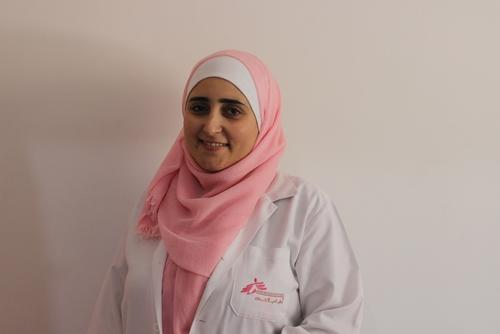
Amani Al Buhisi– Health Education Nurse
I started working with MSF three years ago as a Health Education Nurse in its project specialized in reconstructive surgery for victims of war.
Health education activities focus on 4 main aspects in: personal hygiene, infection control, nutrition and smoking which is dangerously affecting the treatment process.
We offer health education services in the inpatient and outpatient departments, and I work with an important and specific group of patients and those are war-wounded children. This group of patients requires special care as they are coming from some very complicated contexts of destructive wars, and thus most of them were deprived of the basic knowledge of personal hygiene and other health educational issues. So we need to adopt awareness-raising strategies that meet their age level, and make it easier for them to get the information in simplified ways, like using for instance their favourite cartoon characters, or certain games or toys to facilitate knowledge concerning personal hygiene. We also talk about healthy practices through group sessions where they perform teeth brushing and hand washing.
One of the major challenges in educating children is dealing with the traumas they had and still live through after all the tragic events they have witnessed in their devastated countries, so it’s crucial to use creative techniques every day to encourage them accepting the information and apply them.
MSF’s specialized project in reconstructive surgery requires a long period of hospitalization, and many patients need multiple phases treatment, so we focus on the idea that the hospital is a second home for patients, and we work to make this home the best place for them away from their war-torn countries, in addition to ensuring the hygienic environment they live in, and giving them the healthcare they need between the different stages of treatment. We also train fathers and mothers or caretakers in general on how to attend to the tiniest details in caring for their children.
Many patients reach the hospital suffering severe infections due to the injuries they had in their countries, and high levels of resistance to the different antibiotics, and here comes the effective role of health education in educating and training patients to adhere to the instructions of infection control for them and their caretakers. What makes this project special is the joint efforts all departments exert towards the one goal of offering high quality medical care for patients.
My work with MSF is a turning point in my career because of the human aspect of the project which urged me and still to develop health awareness approaches, and use the experience I obtained through this project to create a solid working base that enables any fellow after me to continue on the same track.




